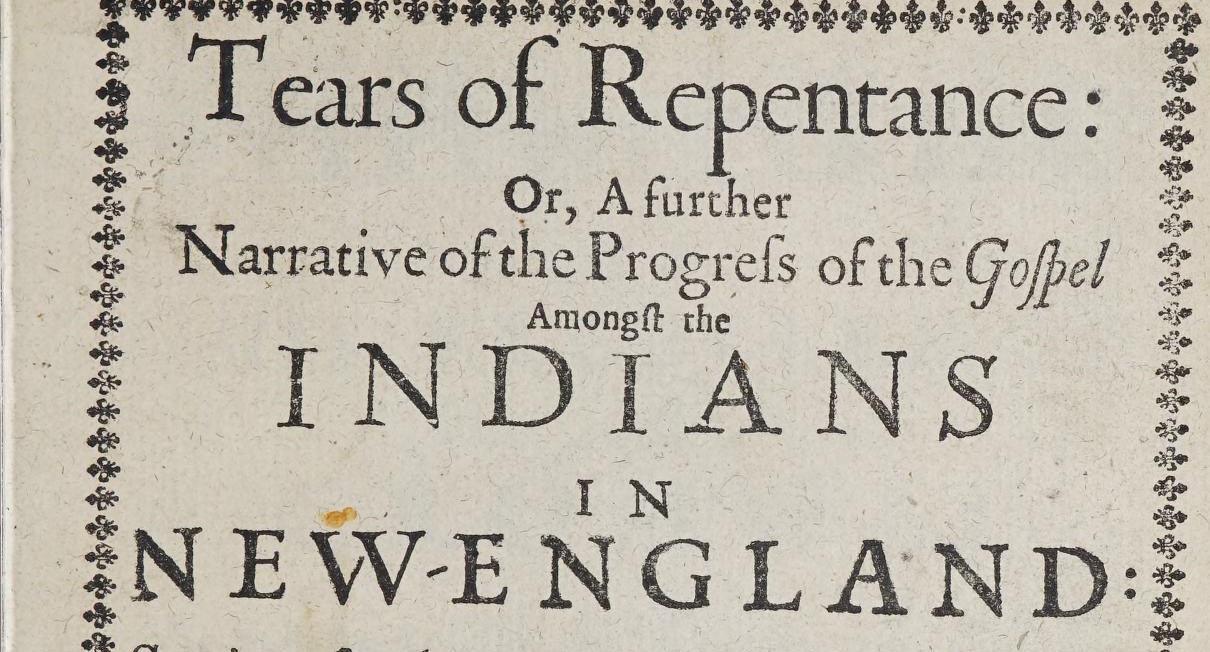What are useful and proper contexts for understanding the significance of the Eliot Bible? This section of the exhibit considers historical contexts such as cross-cultural encounters and linguistic exchange to reveal different ways of interpreting an object like this. It also considers the context of religious missions as a way to understand the significance of this particular Bible in early American history and beyond.
Language As Culture: Language in the Eliot Bible
by Devin Manley, Bridget Ulbert, and James O’Connor
This project explores the translation, or lack thereof, of English ideas of important concepts within the Christian Bible into the Wampanoag language. Some examples include the fact that words such as Testament, Jerusalem, and God are kept in the English spelling despite being in the middle of a sentence in Wampanoag. We want to identify the reasons behind keeping such terminology in English spelling, and how this reflects Eliot’s beliefs as well as his colonial project. By doing so, we also expect to gain insight into the fledgling, ongoing state of cultural assimilation these Wampanoag people were facing at the time of the bible’s production. In addition, we will extend the idea of a “cross-cultural encounter” into the modern day by examining the use of documents such as the Eliot bible in language and culture revitalization projects among various Indigenous groups. We are interested in how these projects relitigate the original encounter, and to what extent they can “reverse” the destruction of that encounter.

View the StoryMap here
Cultural Compromises: Religious Syncretism in the Eliot Bible
by Jim Gazis and Dylan Rapp
Following the most common narratives of American History, an amateur historian would gain the impression that the supremacy of the United States was inevitable. From Jamestown onward, there was a slow but inescapable advance of English colonists manifesting their destinies from sea to shining sea. Along the way, this unstoppable force of American expansion would occasionally meet resistance, but those who stood in the path of the United States’ God-given mission would either be destroyed or assimilated. These narratives have been challenged since their inception by those being allegedly destroyed or assimilated, the American Indians, but only relatively recently has academia embraced this perspective. In creating this project, we hope to add to the growing discussion on this topic by highlighting the lack of complete erasure of indigenous cultures. We hope to show how, since European arrival, compromise with American Indians has occurred and that American Indians have been key agents in working to shape their own futures. Our main vehicle to explore this will be the compromises made in colonial New England and neighboring regions as the Europeans tried to convert the indigenous peoples to Christianity.
View the StoryMap here

Reconciling Religion: Puritan and Quaker Faiths in Early America
by Nico Divizio, Alina Popatia, and Dan Kane
The colonies of New England and Pennsylvania are two of the most notable of the colonial age. They both possessed distinct religious characteristics, while also having quite different relations with the local American Indians. While the Puritans of New England took a more religiously strict approach in wishing to convert the American Indians to their religion, the Quakers of Pennsylvania held the view of religious freedom. This is what the common narrative says, anyway. A deep examination into these respective colonies and their trajectories reveals two different tales of religious hypocrisy and justification. How could it be that these colonies which violated the principles of their own religions turned out so differently? To answer this question, a close examination into the trajectories of these unique locations must be conducted.

View StoryMap here
Puritan Theology and the John Eliot Bible
by Drake Southwell, Jake Poplawski, Andrew Reagan, & Emilio Soto
Puritan theology was varied and constituted a milieu of competing beliefs, but most were strict Calvinists. Calvinism is a branch of Protestant Christianity that originated in Switzerland in the 16th century under the leadership of John Calvin. Calvinism is characterized by the belief in predestination, which means that God has already chosen who will be saved and who will be damned before they are born. This doctrine is based on the idea that humans are born sinful and that they cannot choose to follow God on their own. Therefore, salvation is a gift from God that is given to those whom he has chosen. Puritans were largely influenced by the following Calvinist beliefs.
View the StoryMap here.



